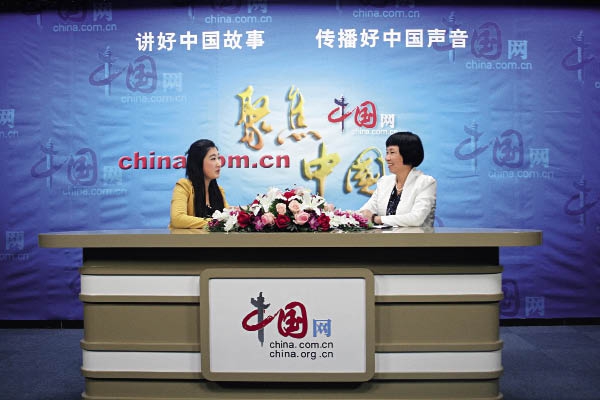By MA BEN
By MA BEN
UNDERNEATH Quan Ruixian’s docile exterior lies a keen-witted and capable businesswoman. A pioneer in the private economy sector after the reform and opening-up policy in China, Quan established her own company in 1995. One year later, she initiated the first private real estate company approved by the local government in Zhanjiang of Guangdong Province. She was the only female entrepreneur in local real estate at that time. Quan is constantly working on undertakings that benefit society as a whole. Climate change and measures to deal with this issue are her major research focus.
Human Factors in Climate Change
Both natural and human factors have affected the climate. But consensus has been reached in scientific circles that human beings have played the larger role in climate change issues. In the last five decades, 90 percent of climate issues were influenced by human activities. After years of observation and research on earth, seisms, and climate, Quan Ruixian has discovered two major climate change factors.

Quan Ruixian gives talks at the 12th China Scientists Forum.
According to her, phenomena that are obvious to all and can be measured by certain indexes constitute the first factor. They include destroying old-growth forests, decreasing vegetation, devastating deforestation to make farmland, truncating mountains to construct new urban areas, reclaiming land from seas and lakes, and the construction of enormous and dense skyscrapers in cities, to name but a few. Cement and rubble used to solidify the foundations of streets and roads lead to rainwater loss and shrinkage of green areas. Development of industries and fossil fueled vehicles demand overexploitation of subsurface energy resources, such as petroleum, natural gas, and coal. Hence, our planet is faced with a worsening greenhouse effect, higher temperatures that accelerate the melting of glaciers in the Arctic, and increasingly severe air pollution, including PM2.5 levels that exceed safety standards.
Quan explained that the second factor in climate change is neither touchable nor seeable, and so often ignored. It is the imbalance during the earth’s rotation and revolution caused by humankind’s destruction of the earth’s crust. Though our planet is capable of self-adjusting, overexploitations of subsurface energy resources like petroleum and natural gas tend to disrupt its balance and result in an abnormal climate.
Under such conditions, the exhausted crust may react to maintain homeostasis and initiate self-rehabilitation by means of the earth’s revolution, rotation, and gravity. Downward permeation of surface water and fluid materials is one of its reactions, and usually causes drought, damages crops, cuts off rivers, dries up lakes and reservoirs, and is thought to contribute to the disappearance of the Aral Sea, ground fracturing, and desertification.
What’s worse, when liquids and fluid materials are no longer able to fill in the crevices on the earth’s crust, heavy tectonic plates descend due to gravity and rotation. Meanwhile, large-scale heavy and dense urban constructions aggravate the imbalance of the earth’s movements and accelerate the plates’ descent or displacement. Stimulated by these factors, crustal movement becomes increasingly active, generating more natural disasters by severe convection weather, rainstorms, floods, and so on.
On top of that, overexploitations of subsurface materials and groundwater may thin the earth’s crust and weaken the functions performed by land, forests, and vegetation covering the earth’s surface, which insulate the heat of mantle lava, and preserve and regulate the thermal properties of the earth’s surface. Such dysfunctions are responsible for the rising temperature, global warming, and the El Niño phenomenon.
Drop heights formed by cavities on the exhausted earth’s crust tend to cause accelerated motions of objects during the earth’s revolution and rotation, which generate enormous shock waves on the crust and surface. Meanwhile, solid materials collide more often due to the lack of petroleum and gas that lubricate and reduce pressure amid solid materials. The impacts give rise to typhoons, tornados, sandstorms, tsunamis, seisms, landslides, collapses, and ground fracturing.
Advocate Energy Conservation and Emission Reduction
The latter factor is Quan’s main finding after years of research and study since 1999. She is aware that further refining is needed, and would like to share and discuss her other findings with more people so as to better understand our planet.

Quan Ruixian is interviewed by china.com.cn.
Through her research in this field, Quan expects the world to understand the potential catastrophic consequences of climate change. She holds that it is imperative to implement energy conservation and emission reduction actions. Governments and people in every part of the world should put more effort into lessening our consumption and reliance on subsurface energy resources to prevent further destruction of the earth’s structure. Quan calls for greater investment and use of new, clean energy. She also believes that countries should establish and keep improving mechanisms to tackle pollutants on the earth’s surface and in the air in a scientific and reasonable way.
Quan urges the setting up of environmental protection mechanisms in every country in order to control and transform pollutants into clean and useful materials. Solidifying the foundations of streets and roads with cement and rubble should be discouraged. Programs to increase green spaces should be promoted. A sound and rational plan is expected for the use of our planet’s resources. Plunder and damage must stop. Efficient, systematic social development can ensure the implementation of energy conservation and emission reduction measures. The world should aim at making the natural environment more harmonious, well-organized, clean, and orderly.
Quan should be commended for her intensive research into such issues as climate change, causes of earthquakes, and measures to deal with smog. Her findings and opinions in this field are inestimably valuable. Despite hardships and misunderstandings she has faced throughout the years, Quan believes that what she has been doing is worthwhile as long as it benefits society and the people.
“The earth is everyone’s home. Therefore, it is everyone’s responsibility to tackle climate change,” Quan concluded.